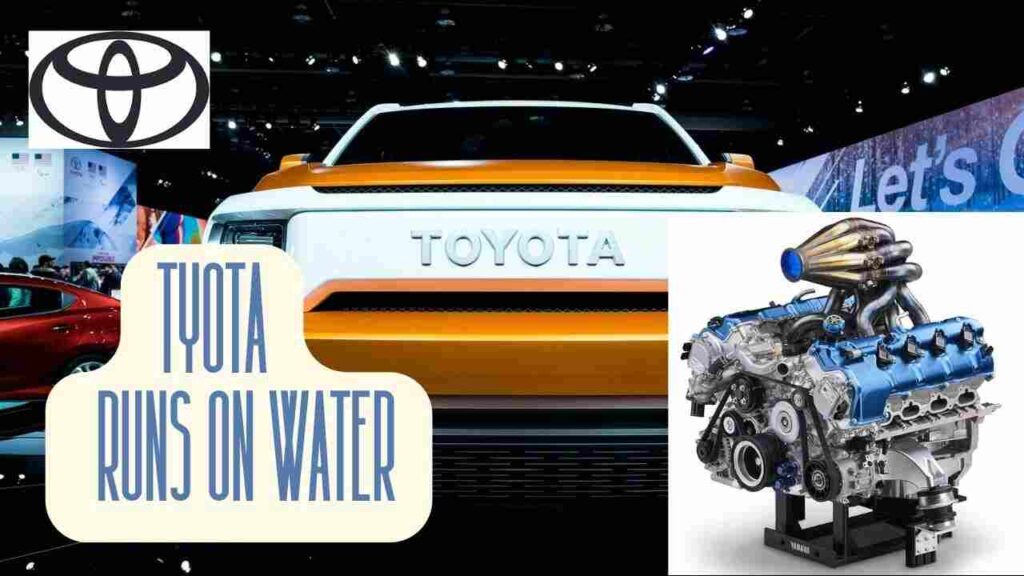
Table of Contents
Tyota’s Hydrogen Combustion Engines
Toyota has taken a bold and unconventional approach to reducing its carbon footprint, defying the industry’s shift towards all-electric vehicles. Instead of following the EV trend, the automaker has developed a groundbreaking hydrogen combustion engine that is poised to shake up the entire automotive landscape.
The Hydrogen Combustion Engine:
Unlike traditional gasoline engines that emit carbon dioxide, Toyota’s hydrogen combustion engine produces only water as a byproduct. This eco-friendly design not only minimizes environmental impact but also offers several key advantages over electric vehicles (EVs).
The hydrogen engine boasts a longer driving range and faster refueling times compared to EVs while reducing the need for limited materials like lithium and nickel which are critical for EV battery manufacturing.
Toyota’s partnership with Yamaha has resulted in the development of a powerful V8 hydrogen engine, producing an impressive 455 horsepower and 398 lb-ft of torque.
Tackling the Challenges of Hydrogen as fuel:
While the hydrogen combustion engine presents a compelling alternative to EVs, the automaker must address the challenges of hydrogen production and fueling infrastructure. Currently, even though hydrogen is widely produced, the process is not always sustainable. Toyota will need to find ways to ensure a reliable and eco-friendly supply of hydrogen to support the widespread adoption of its hydrogen-powered vehicles.
Additionally, the lack of hydrogen fueling stations compared to gasoline and electric charging stations poses a significant hurdle. Toyota will need to work closely with governments and industry partners to build the necessary infrastructure to support the hydrogen ecosystem.
Integrating Hydrogen Technology into Diverse Powertrain Options:
Toyota’s commitment to carbon neutrality extends beyond just hydrogen combustion engines. The automaker has embraced a multi-faceted approach, including the development of battery electric vehicles (BEVs) and plug-in hybrid electric vehicles (PHEVs).
By offering a range of powertrain options, Toyota aims to cater to the diverse needs and driving conditions of customers around the world. This Diversified strategy recognizes that different regions and markets have varying energy sources, infrastructure, and environmental policies, requiring a tailored approach to achieve the goal of carbon neutrality.
Toyota’s Water-Powered Engine
If the hydrogen combustion engine wasn’t disruptive enough, Toyota is now exploring an even more revolutionary technology: a water-powered engine. This concept, while seemingly straight out of a science fiction movie, is a testament to Toyota’s relentless pursuit of sustainable mobility solutions.
The Science Behind Water-Powered Engines:
The idea of an engine that runs on water may seem far-fetched, but Toyota’s approach is grounded in the chemical composition of water (H2O). By using electrolysis to separate the hydrogen atoms from the oxygen, the extracted hydrogen can be used as a high-energy fuel in a combustion process similar to traditional gasoline engines.
The key advantage of this technology is that the combustion of hydrogen produces only water as a byproduct, eliminating carbon emissions entirely. Toyota’s commitment to developing and protecting this innovative technology through patent filings suggests a serious investment in making water-powered engines a reality.
Overcoming the Challenges of Water-Powered Engine Integration
Integrating a water-powered engine into practical automotive applications presents numerous challenges for Toyota. The automaker will need to develop an efficient electrolysis system to extract hydrogen from water, as well as safe hydrogen storage solutions and engine designs that can handle the unique properties of hydrogen combustion.
Despite these hurdles, Toyota’s track record of innovation and technological breakthroughs suggests that the company is well-equipped to overcome these challenges and bring the water-powered engine to fruition.
Conclusion: Shaping the Future of Sustainable Mobility
Toyota’s hydrogen combustion engines and its pursuit of water-powered engines represent a significant departure from the industry’s focus on electric vehicles. By exploring alternative fuel sources and powertrain technologies, the automaker is demonstrating its commitment to diversifying sustainable transportation options and addressing the complex challenges of environmental sustainability.
